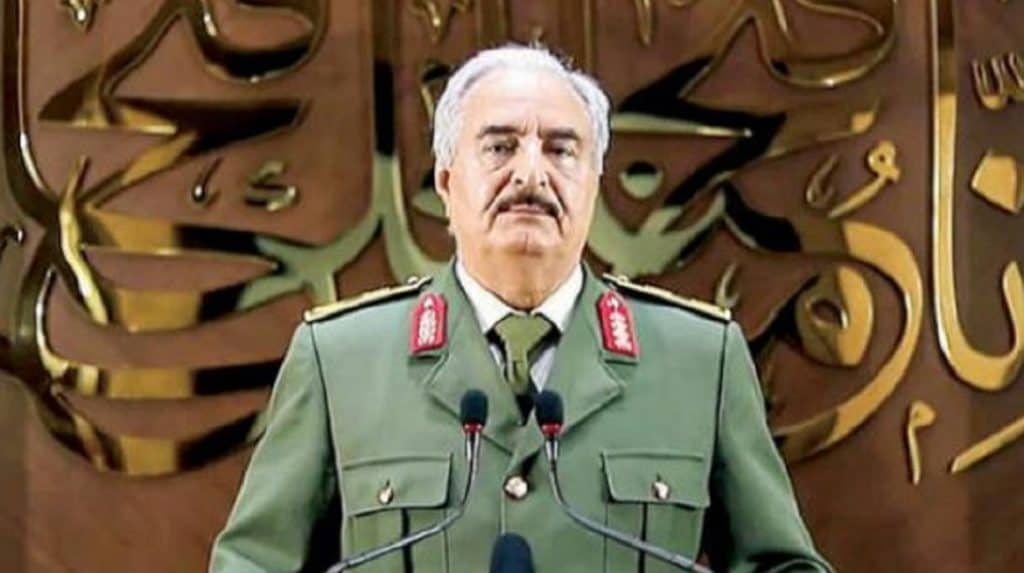By Denis Korkodinov
The decision by the Libyan national army commander Khalifa Haftar to boycott the terms of the Shirat agreement, a United Nations initiative signed on December 17, 2015, represents a new stage in the Libyan conflict.
Indeed, the Libyan field marshal has proclaimed himself the only legitimate leader of the state, thus questioning the authority of the government of the national agreement of Fayez al-Sarpaj. Thus, Khalifa Haftar, analysts say, was able, through a political declaration, to do what he was unable to do with weapons: to carry out a coup.
It is worth noting that international support for Fayez al-Sarraj and Khalifa Haytar’s forces is currently almost the same. At the same time, it is clear that the armed formations located in Tripoli, as well as the Misrata militia, together with the Muslim Brotherhood movement and Turkey, are not currently ready to recognize the authority of the Libyan field marshal after the failure of the Shirat Agreement. In this regard, the statement by the Libyan national army commander on the revival of the country’s government functions may lead to the finalization of double power in Libya, which can serve as a basis for a new escalation of the conflict.
Washington and the United Nations mission in Libya were among the first to refuse to recognize Khalifa Haftar’s authority after his high profile assertion. At the same time, they approved the initiative of Tobruk head of parliament Akila Saleh on a political solution to the Libyan conflict.
Taking into account, however, that Akila Saleh has publicly expressed his support for the commander of the Libyan national army, it can be assumed that the approval of his initiative by the international community was seen in Benghazi as a subtle indication that Khalifa Haftar’s decision, in general, would not seriously meet the resistance of the United States and the United Nations, which may have actually accepted the idea of dividing Libya between the two centers of power.
In turn, the White House administration has expressed particular concern about the future of the Shirat agreement, the refusal of which may create an opportunity to start a new negotiation process aimed at delimiting the interests of the Libyan national army and the government of National Accord. But, based on the fact that none of the conflicting parties are interested in resuming dialogue at the highest levels, the blockade of the agreement of Shirat may lead to the start of a new series of large-scale clashes between competitors groups.
In this regard, the position of the Libyan representative to the UN , Taher al-Sunni, who underlines the international community’s reaction to the Khalifa Haftar declaration, is quite justified. In other words, it doesn’t matter what the Libyan national army commander said. More important is how his words will be perceived by the countries that act as guarantors of stability and security in Libya.
The Libyan field marshal could have overthrown the Al-Vefak government using military force. But this would have taken additional time, which Khalifa Haftar did not have. For more than a year he has tried to create the conditions for an attack on Tripoli, risking the lives of his soldiers and convincing his partners of the opportunity to overthrow Fayez al-Sarraj and his entourage.
The COVID-19 pandemic provided the commander of the Libyan national army with a unique opportunity, using popular diplomacy, to create a real threat to the existence of the government of the National Agreement, which, if the Shirat agreement failed, would lose its legitimacy. Therefore, Khalifa Haftar may have achieved a political victory, which was perceived internationally as a coup.
Following Khalifa Haftar’s statement, the Tobruk House of Representatives at one point played the role of a “pendulum”. The position chosen by Akil Saleh depended on how far the coup d’état carried out by the Libyan field marshal would have been possible. For this reason, the head of the House of Representatives organized a series of meetings with local tribal leaders and high-ranking military personnel to verify the correctness of their choice in favor of Khalifa Haftar.
Furthermore, Akila Saleh warned that a coup in Libya would inevitably lead Fayez al-Sarradd’s forces to attempt to launch a large-scale military offensive in the western part of the country and, above all, in El Marge, which, according to analysts, represents the cornerstone of a new phase of the Libyan crisis.
In turn, after the end of the Shirat agreement, Khalifa Haftar will have to reaffirm, even through arms, his authority in southern Libya. The problem is that the leader of the Supreme Council of the Southern Tribes, Ali Mesbah Abu Sabah, formerly loyal to the Libyan field marshal, is now extremely cautious in continuing to support Khalifa Haftar’s forces, fearing an attack by armed groups controlled by the government Al-Vefak.
(The opinions expressed in this article are solely those of the author and do not necessarily reflect the views of World Geostrategic Insights)







